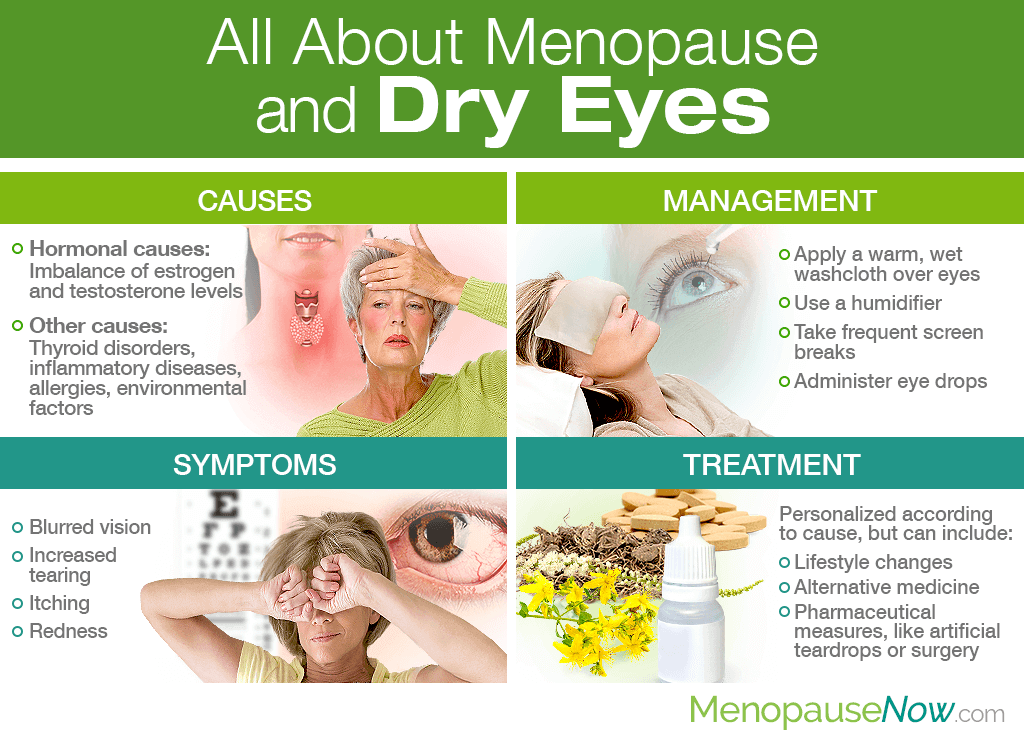It is common for various vision changes to occur in women as they are transitioning through periods of hormonal fluctuation, including perimenopause. Nevertheless, women can rest assured that vision changes, such as dry eyes, during menopause can be successfully managed and treated for improved eyesight.
Continue reading to learn all about menopause and dry eyes, including the causes, symptoms, management, and treatment options for dry eyes during menopause so that you can go forth in eye health.
Causes of Dry Eyes during Menopause

Dry eyes are more prevalent in females, especially those in menopausal age, pushing researchers to investigate exactly why this may be.
Hormonal causes
Androgens and estrogen have effects on eye health as receptors for both groups of reproductive hormones have been found on glands responsible for healthy tear production.
However, the exact relationship between sex hormone levels and dry eyes during menopause is unclear and contradictory. While some studies find that estrogen and testosterone levels are increased in menopausal women with dry eyes, others find that those suffering from severe dry eye symptoms had lower levels of both hormones.
Other causes
Dry eyes can also be caused by a variety of health conditions, such as thyroid disorders; inflammatory diseases, like lupus and rheumatoid arthritis; chronic inflammation; allergies; and more.
Likewise, environmental factors such as dry winter air, low humidity, summer air conditioning, and prolonged reading or computer work can lead to symptoms of dry eyes during menopause.
Symptoms of Dry Eyes during Menopause

Women who suffer from perimenopause dry eyes may also find that their condition is accompanied by:
- Blurred vision
- Light sensitivity
- Increased tearing
- Burning
- Itching
- Redness
- Swollen eyelids
Management Techniques

The following may be implemented to bring alleviation to your dry eyes no matter your age:
Apply a washcloth that is clean, warm, and wet over closed eyes.
Use a humidifier to set the bedroom to at least 40 percent humidity when sleeping.
Wear sunglasses when outside for protection from the wind and the sun.
Take frequent breaks when having to read or stare at a screen for extended periods of time.
Avoid vents that blow heat or air conditioning directly into your face.
Consider taking fish oil supplements, which are rich in omega-3 fatty acids, for eye health.
Administer eye drops to lubricate the eyes and decrease any inflammation.
Treatment Options

Without a doubt, the most effective way to treat dry eyes during menopause is to promote hormonal equilibrium through non-invasive measures.
Natural and effective menopause symptoms treatments for optimal endocrine system function focus on lifestyle changes that include an improved diet rich in plant-based estrogen (phytoestrogens) and healthy habits - quitting addictions, reducing stress, etc. - alongside the use of alternative medicines, such as phytoestrogenic herbal supplements or hormone-regulating supplements, for best results.
Phytoestrogenic herbal supplements, like black cohosh and St. John's wort, contain stronger concentrations of plant-based estrogens than their dietary counterparts. However, since they introduce exogenous hormones into the body, their extended use is not recommended.
On the other hand, hormone-regulating supplements, like Macafem, encourage the endocrine and pituitary glands to produce their own hormones, thus resolving the hormonal imbalance at fault for dry eyes and other menopause symptoms. Because these supplements do not introduce outside hormones into the body, they are safer for long-term use.
Women whose dry eyes are caused by other conditions should discuss further treatment options with an ophthalmologist, an eye doctor. He or she will run the appropriate tests necessary to diagnose what could be causing your dry eyes during menopause.
Common pharmaceutical treatments for dry eyes include using artificial teardrops and ointments, temporarily plugging the tear drains, or undergoing tear duct surgery.
Sources
- American Academy of Ophthalmology. (2015). The link between seasonal allergens and dry eye. Retrieved April 23, 2019, from https://www.aao.org/eye-health/news/allergies-linked-to-dry-eye
- Cleveland Clinic. (2014). Dry Eyes: Management and Treatment. Retrieved April 23, 2019, from https://my.clevelandclinic.org/health/diseases/9030-dry-eyes/management-and-treatment
- The North American Menopause Society. (n.d.). Menopause and Eye Health. Retrieved April 23, 2019, from https://www.menopause.org/for-women/menopauseflashes/women%27s-health-and-menopause/menopause-and-eye-health
- Peck, T. et al. (2017). Dry Eye Syndrome in Menopause and Perimenopausal Age Group. Journal of Mid-Life Health, 8(2), 51-54. doi: 10.4103/jmh.JMH_41_17
- UW Health. (2010). Dry Eye and Post-menopausal Women. Retrieved April 23, 2019, from https://www.uwhealth.org/news/dry-eye-and-post-menopausal-women/26731

